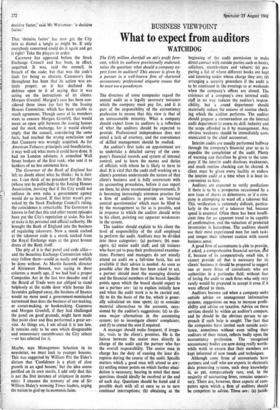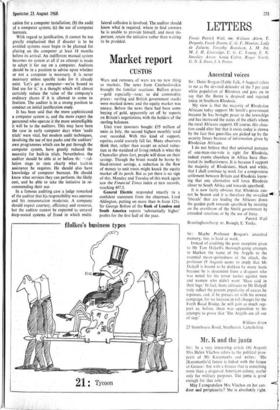What to expect from auditors
BUSINESS VIEWPOINT WATCHDOG
The f144- million shortfall on AEI's profit fore- cast, which its auditors provisionally endorsed, raises the question: what should a company ex- pect from its auditors? This answer is given by a partner in a well-known firm of chartered accountants: professional etiquette means that he must use a pseudonym.
The directors of some companies regard the annual audit as a legally necessary nuisance which the company must pay for, and it is part of the responsibility of the accountancy profession to ensure that this view is that of an unreasonable minority. What a company should expect from its auditors is a reflection of what the auditors should be expected to provide. Professional independence does not entail a lack of courtesy, and the convenience of skilled management should be studied.
An auditor's first tasks on appointment are to undertake a detailed survey of the com- pany's financial records and system of internal control, and to learn the names and duties of officials with whom he is likely to have to deal. It is vital that the audit staff working on a client's premises understands the nature of that client's business and is fully conversant with its accounting procedures, before it can report on them, let alone recommend improvements. It is becoming increasingly common practice for a firm of auditors to provide an 'internal control questionnaire' which must be filled in by the management so far as is possible, and in response to which the auditor should write to his client, pointing out apparent weaknesses in the system.
The auditor should explain to his client the level of responsibility of the staff employed to perform the audit. Auditors may be divided into these categories : (a) partners; (b) man- agers; (c) senior audit staff; and (d) trainees who have yet to pass their professional examina- tions. Partners and managers do not usually attend an audit on a full-time basis, but are available if their advice is needed. As soon as possible after the firm has been asked to act, a partner should meet the managing director and the financial members of the board. Specific points upon which the board should expect to see a partner are: (a) to explain initially how and when the audit work is to be carried out; (b) to fix the basis of the fee, which is gener- ally calculated on time spent; (c) to consider material alternatives to the accounts, occa- sioned by the auditor's suggestions; (d) to dis- cuss major alternatives in the accounting system; (e)• to investigate clients' complaints; and (f) to attend the nom if required.
A manager should make frequent, if irregu- lar, visits to the client's premises. He is the liaison between the senior - man directly in charge of the audit and the partner who has the overall responsibility. The senior man in charge has the duty- of causing the least dis- ruption during the course of the audit. Specific matters which a good man will attend to are: (a) settling minor points on which further eluci- dation is necessary, bearing in mind that most questions should ideally be resolved at the end of each day. Questions should be listed and if possible dealt with all at once so as to save continual interruptions; (b) obtaining at the beginning of the audit permission to make direct contact with outside parties such as banks, solicitors, stockbrokers and valuers; (c) pre- paring a list of where different books are kept and knowing under whose charge they are; (d) arranging a security procedure if the audit is to be continued in the evenings or at weekends when the company's offices are closed. The existence of a company's own internal audit staff in no way reduces the auditor's respon- sibility, but a sound department should materially reduce the volume of routine check- ing which the auditor performs. The auditor should prepare a memorandum on the internal audit department to assess its skill, industry and the scope afforded to it by management. Any obvious weakness should be immediately' com- municated to the chief accountant.
Interim audits are usually performed halfway through the company's financial year so as to expedite the., completion of the audit. Plenty of warning can therefore be given to the com- pany if the interim audit discloses weaknesses, and much routine checking can be cleared. A client must be given every facility to endure the interim audit at a time when it is least in- convenient to. him.
Auditors are expected to verify predictions if there is to be a prospectus occasioned by a new issue of shares or debentures, or if a com- pany is attempting to ward off a takeover bid. This verification is extremely difficult, particu- larly in the case of a takeover bid, because speed is essential. Often there has been insuffi- cient time for an apparent trend to be capable of confirmation, and the valuation of protected inventories is hazardous. -The auditors should use their most experienced men for such tasks and temper their inherent caution with sound business sense.
A good firm of accountants is able to provide, if asked, a comprehensive financial service, aild if, because of its comparatively small size, it cannot provide all that is necessary for its clients' business it should be prepared to suggest one or more firms of consultants who are authorities in a particular • field, without fear of losing the audit to such-firms who only very rarely would be prepared to accept it even if it were offered to them. - Auditors become sad when a company seeks outside advice on management information systems, suggestions on way to increase profit- ability and advice on taxation. Advice on these services should be within an auditor's compass, and he should be 'the obvious person to- ap- proach if such help is sought. The fact that the companies have invited such outside assis- tance, sometimes without even telling their auditors of their intent, reflects badly upon the accountancy -profession. The recognised accountancy bodies are now doing really worth- while work to -ensure that their members are kept informed of •new trends and techniques.
Although some firms of accountants have partners -and staff who-are experts in electronic data processing systems, such deep knowledge is, as yet, comparatively rare, and, in the majority of accounting firms, remains unneces- sary. There are, however, three aspects of com- puters upon which a firm of auditors should be competent to advise. These are: (a) justifi-
cation for a computer installation; (b) the audit of a computer system; (c) the use of computer bureaux.
With regard to justification, it cannot be too greatly emphasised that if disaster is to be avoided systems must begin to be planned for placing on the computer at least 18 months before its arrival. An indifferent manual system becomes no system at all if an attempt is made to adapt it for use on a computer. Auditors should be in a position to advise upon whether or not a computer is necessary. It is never necessary unless specific tasks for it already exist. 'Let's get a computer—we're bound to find use for it,' is a thought which will almost certainly reduce the value of the company's ordinary shares if it is, allowed to come to fruition. The auditor is in a strong position to conduct an initial justification study.
It has been said that the more sophisticated a computer system is, and the more expert the personnel who operate it the more unintelligible it will be to the auditors. This may have been the case in early computer days when 'audit trials' were vital, but modern audit techniques, involving the use of test packs and the auditors' own programmes which can be put through the computer system, 'have greatly reduced the necessity for built-in trials. Nevertheless. the auditor should be able at or before the .-,stal- lation stage to state clearly what built-in assistance he requires: He should also have knowledge of computer bureaux. He should know what services they can perform, the likely cost, and be able to take the initiative in re- commending their use.
In a famous auditing case a judge remarked of the auditor that his responsibility was onerous and his remuneration moderate. A company should expect courtesy, efficiency and resource, but the auditor cannot be expected to unravel deep-seated systems of fraud in which multi-
lateral collusion is involved. The auditor should know what is required, where to find answers he is unable to provide himself, and most im- portant, retain the initiative rather than waiting to be prodded.



































 Previous page
Previous page